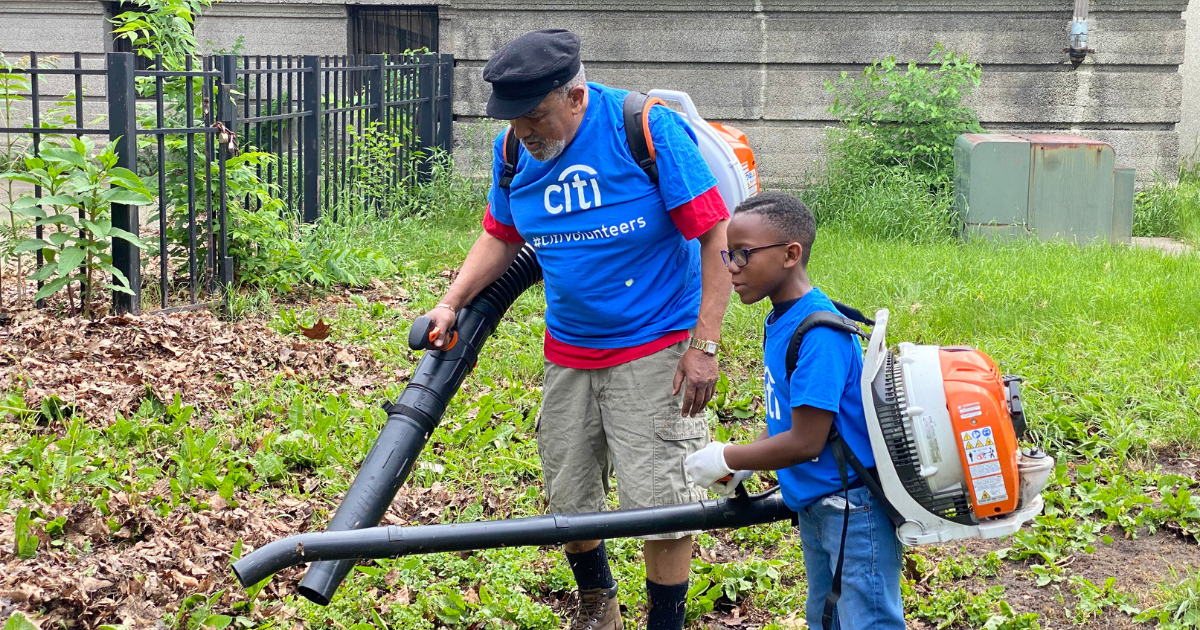The day was over. Another cleaning job was complete. This one was at the DuSable Museum of African American History in Washington Park. Dead leaves were everywhere on the west side of the building. It was a spring-cleaning task like no other.
Enter Sel Dunlap. Many people simply call him Sel when they introduce him to friends and colleagues. On this day, Sel brought four leaf blowers he owns for a community cleanup at the DuSable Museum. There were plenty of rakes, trash scoopers and garbage bags for the 15 volunteers.
With a big cleaning job, Sel looked as if he was going to war. He and two other men threw on leaf blowers like they were tactical gear. With an army of volunteers from the Black Star Project, the group was ready for battle, along with the organization’s executive director, Gloria Smith.
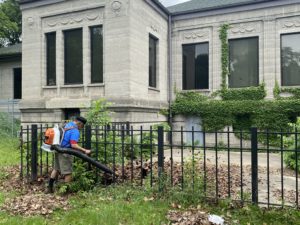
For hours on a cool Saturday morning, they attacked their enemy. Piles and piles of leaves that had covered the lawn and crowded the bases of trees flew off the ground as the blowers hummed. By early afternoon, the leaves were stuffed into 45 jumbo garbage bags. The load was smaller than last week, when Sel and his crew filled 50 garbage bags of leaves that once littered the museum’s terrace and back lawn.
For Sel, it was another job well done. For more than 20 years, he has spent countless hours, days and months picking up trash from neighborhoods on Chicago’s South and West sides. It’s a thankless job no one likes to do. But for Sel, it has been a labor of love that has gained him little recognition and no pay.
On some occasions, he has volunteers to help, but many times Sel removes pounds of trash alone. His job carries little respect, and he is rarely greeted by residents who pass by him on the street. His job can get lonely at times, but for Sel, it’s a rewarding task that can make communities look and feel better to live in.
He’s an unsung hero who scours Black neighborhoods day and night looking for filthy vacant lots and parks to clean. When he is grabbing empty bottles and dirty cans, most residents look, but don’t help him clean up. He’s told stories of how some toss more trash on the ground while he’s cleaning it up. But Sel keeps going.
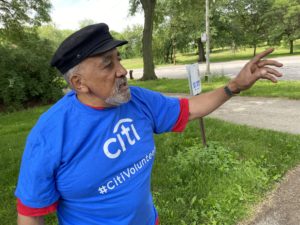
the west side of the DuSable Museum of African American History.
He believes that cleaner neighborhoods help improve the mental health of their residents and reduce crime. He also cleans up trash to add value to neighborhoods and instill pride and a sense of ownership among residents.
He knows ward superintendents, aldermen and residents, but few know him.
A Crusader journalist met Sel in March as he cleaned the front entrance of Oak Wood Cemetery in preparation for the funeral of WVON co-founder Pervis Spann. Dead leaves and debris sat along the wall of 67th street from Greenwood to Cottage Grove. When Sel realized he would need more than a rake, he got in his truck and drove to Michigan City, Indiana, just to get his leaf blower. The round trip was 120 miles and took three hours. By 4 p.m., the area near Oak Woods Cemetery was clean once again.
A Vietnam veteran who suffers from post-traumatic stress disorder, Sel spends on average about six hours to clean a vacant lot. In his lifetime, Sel has thrown away empty cans, bottles, cigarette butts, whiskey bottles, foam, plastic bags. During the pandemic, old face masks was a common item found on the ground.
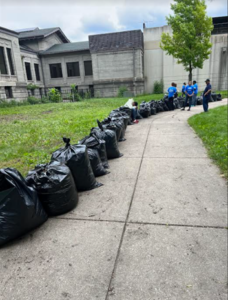
of African American History filled 45 bags of leaves.
Mother Nature is always a problem as branches fall from trees and leaves drop. Sel’s biggest enemy is the wind. It often picks up trash and drops it back into areas that have just been cleaned.
Sel’s job often puts him in direct contact with residents who live in neighborhoods littered with trash.
“They would say or ask me where do you live? Who do you think you are? Who cares? It’s going to always look like this. It ain’t my problem. It ain’t my job. I ain’t getting paid to do it. That’s somebody’s else job,” Sel recalled.
“I have watched people watch us. We would clean a block while residents are sitting on their porch watching us,” Sel said.
Sel said on one occasion, he saw a lady pull up to a stop sign while he was at a service station in Lansing, MI. “She opened her door and set a foam cup down on the street. And I was talking to the owner of a nearby service station. I walked over to the lady before the [traffic] light changed, picked up that item that she had put on the road, and knocked on her window. She looked up and I held it up to her window. She rolled down the window, took back the cup and pulled off. I guess she was so embarrassed that somebody would catch her doing something like that.”
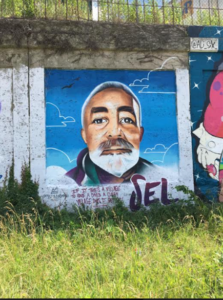
Latino artists painted the mural to honor him.
Sel takes a lot of pride in his work. He has numerous pictures of areas he has cleaned over the years. He keeps them in large albums in his apartment on the Near West Side. And there’s a mural in University City with Sel’s image on a wall overlooking a vacant lot that he often cleans. Located at Damen and 14th, Sel said several Hispanic artists several years ago painted it to thank him for cleaning the area, which is often overcome with weeds that Sel occasionally removes.
“I gave them this picture and they put my big head up and it took up about the whole damn space,” Sel said.
Born in Greenwood, Mississippi, in 1946, Sel was raised in Kingsford Heights, Indiana, about 20 miles south of Michigan City. His father Sell Dunlap was a master barber who owned a barber shop, and his mother McMillan “Mattie Sue” Dunlap was a domestic worker and seamstress. They had four children and Sel was their only son. The second oldest child, Sel often kept the sidewalks clean outside his home and washed the family vehicles.
Sel’s mother once cleaned the home of Charles Finley the former owner of the Athletic A’s baseball team.
“I stopped by there one day after mowing some lawns and she took me on a little tour of the house. Their kitchen was bigger than our living room in La Porte County, Indiana,” Sel said.
“I just got so mad that my mama had to be cleaning up these white folks’ homes. But that was the way it was. But then she was a seamstress who was very, very good. Later in life, she ended up being the head seamstress for the Carson Pirie Scott Department Store in Michigan City. Whenever the president of Carson Pirie Scott would travel from Chicago to Michigan City to check on the store, he would bring garments, clothing that he purchased. If they needed any alterations, he would make sure everybody understood that Ms. Dunlap would do them.”
After attending Purdue University’s North Central campus in Michigan City in Indianapolis, Sel moved to Chicago in 1966 and got a job working for Consolidated Freightways, a trucking company. He worked for three months before he was drafted into the U.S. Army and served in the Vietnam War.
After serving his country, Sel went back to Purdue’s North Central campus to work on a bachelor’s degree in business administration, but he did not finish college. Sel said he dropped out after his girlfriend from Chicago said she was pregnant with his child. Sel said when he told his girlfriend that he wanted to marry her, she told him that she wasn’t pregnant after all. Sel said when he asked her to go to the doctor to confirm whether she was pregnant, his girlfriend refused.
In 1970, Sel returned to Chicago. He worked at Western Electric at Cicero and 22nd. He left after working there for a year. He then worked at GMAC as a field representative while working part time at UPS.
While working these two jobs, Sel said he took night courses in business at Malcolm X College, where a school official referred him to a job in Austin. The job opening was as coordinator for a community organization that focused on public housing. Sel said the job got him started in community work.
After a year with the non-profit, Sel said in 1974 he worked as a property manager for South Austin Realty Association which manages HUD properties. In 1989, Sel and a friend opened Edna’s, a seafood restaurant in Washington, D.C. Two years later, Sel worked for the Washington, D.C., Office of Recycling, where he helped establish a recycling program for the district.
After Edna’s closed in 1992, Sel moved back to Chicago. He lived in Lansing, IL, 27 miles south of the city. He lived with his former girlfriend, an elementary school principal. He assisted her as she performed community work in the North Lawndale area. At the same time, Sel was rehabbing a six flat building in North Lawndale. Sel said working on the property and doing community work, he grew tired of seeing trash and debris throughout North Lawndale.
“That’s when I realized something needs to be done in the cleaning up of all communities. I saw that there was such a detrimental impact on communities as a result of all this trash and debris. So, I started trying to identify with other groups that were engaged in that. I realized it had a negative impact on property values. I realized it had a negative impact on people and how they felt about themselves.”
Sel said the first neighborhood that he cleaned was North Lawndale. He said, “It was worthwhile. I felt I had done something. I felt that I had humbled myself. I felt that I had tackled something that other people didn’t want to be bothered with.”
Since then, Sel estimates he has cleaned at least 15 neighborhoods on Chicago’s South and West sides. The ones Sel said he has cleaned the most are Austin, East Garfield Park, West Garfield Park, and Roseland.
Sel said out of Chicago’s Black neighborhoods, he has cleaned the North Lawndale community the most. He said his involvement in a mentoring program has created a special bond between himself and the West Side neighborhood. Sel said many youths in the program in North Lawndale have parents who are in prison.
“I would take them out on clean-up projects,” Sel said. “So North Lawndale became the area that got most of my attention.”
In addition to working with volunteers from the Black Star Project, Sel also works with Talking Trash and the West Chesterfield organization, which also hold community clean up events. Chris Shuttlesworth, who has a mentoring program, also works with Sel on community cleanup projects.
Politically, Sel has had some frosty relationships with several aldermen. He grew disillusioned with former Alderman Michael Scott (24th) who abruptly resigned last month to take an executive job with Cinespace Studios.
“He ran on a platform [in 2015] that he was going to clean up North Lawndale [but] he told me in a meeting that he really wasn’t into this clean up thing the way I was. That was when I severed ties with him. I haven’t been to the office over three years since he told me that. His ward is one of the dirtiest wards in Chicago. I just wouldn’t understand why he wouldn’t take that position.
“I worked with Alderman [Howard] Brookins in the 21st Ward. He introduced an amendment to the anti-littering ordinance that I supported, where he proposed people who get caught throwing trash out their vehicles would be fined up to $1,500. That was at least five years ago. But the ordinance hasn’t been enforced by the police enough.”
There’s also the question of how much the city is responsible for holding owners of dirty vacant lots accountable as opposed to residents.
“I’m trying to deal with it from both ends, from the city’s and residents’ perspectives. The environment influences the mind, and the mind influences the environment.
“The rally that we had on February 28 at the [Daley] Plaza, spoke to that. We weren’t there just to point a finger at the city, but it was also to point a finger at us. The city needs to become more responsible than they are. We need to become more responsible ourselves.”
Despite his passion for clean neighborhoods, Sel never considered a position as ward superintendent.
“I enjoy my ability to be flexible. That would be too much of a responsibility that I’m not willing to dedicate myself to. And the other thing is that ward superintendents need someone like me who can argue their position from where they’re not able to.”

